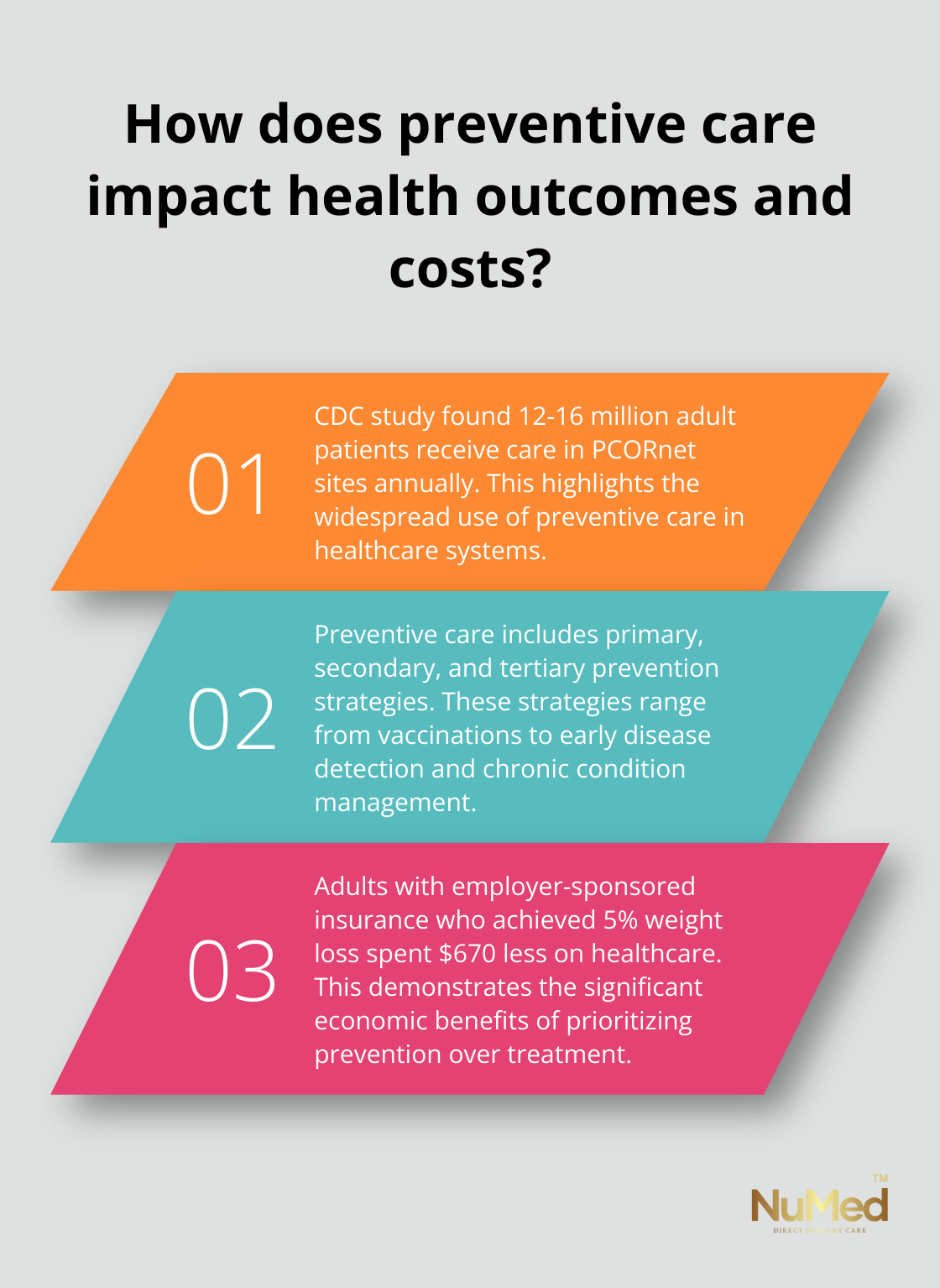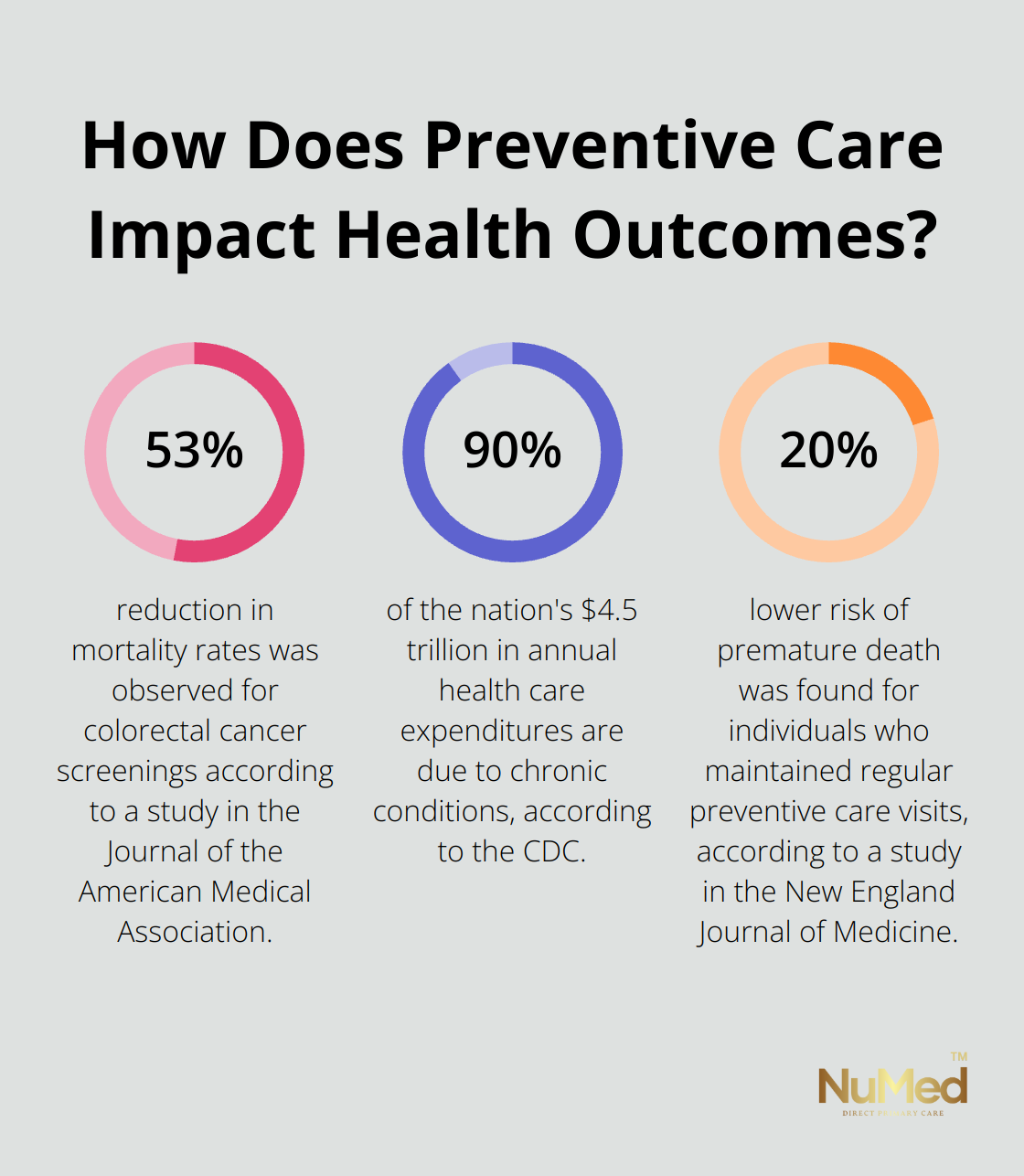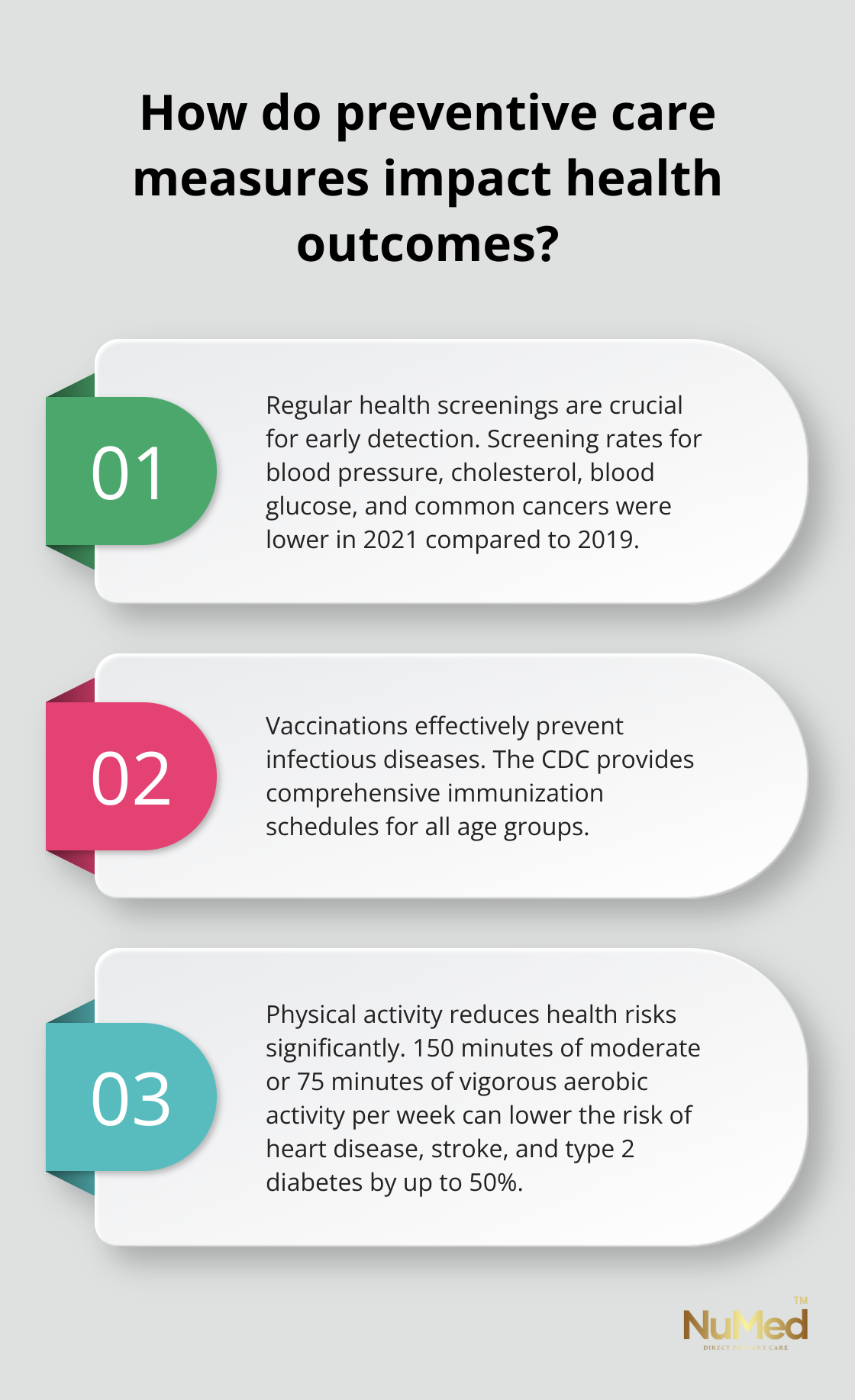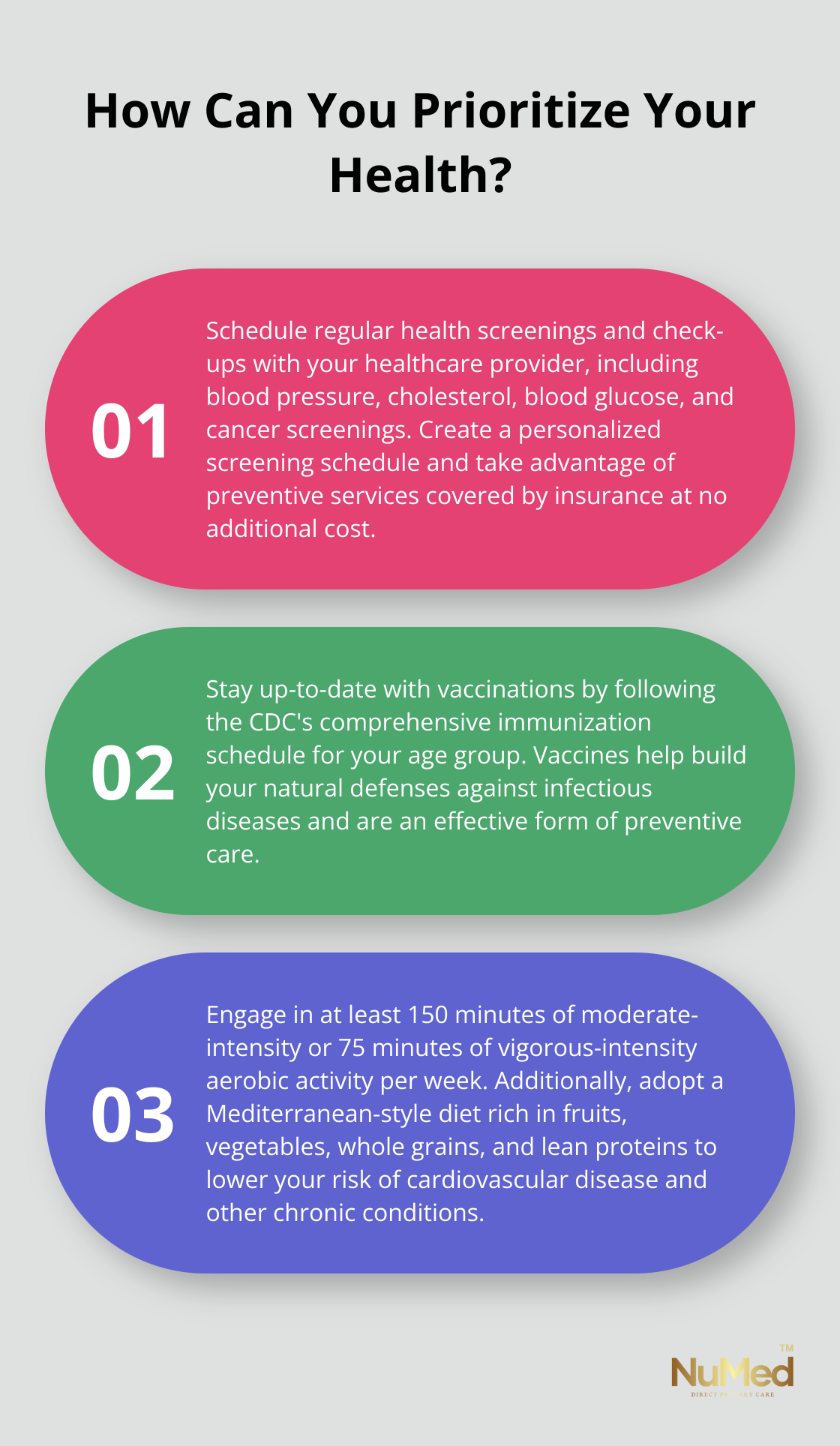At NuMed DPC, we believe the importance of preventive care in healthcare cannot be overstated. It’s the cornerstone of a healthier society and a more efficient healthcare system.
Preventive care focuses on maintaining good health and catching potential issues early, before they become serious problems. In this post, we’ll explore why preventive care is crucial, its many benefits, and how you can make it a priority in your life.
What Is Preventive Care?
The Scope of Preventive Care
Preventive care represents a proactive approach to healthcare that focuses on maintaining good health and preventing diseases before they occur. It encompasses a wide range of services designed to keep you healthy, including regular health screenings, vaccinations, and lifestyle counseling. A CDC study found that approximately 12 to 16 million adult patients per year received care in participating PCORnet sites, which highlights the importance of preventive care in healthcare systems.
Types of Preventive Services
Preventive services fall into three main categories:
- Primary prevention: This category includes measures to prevent diseases from occurring in the first place (e.g., vaccinations, health education, and lifestyle modifications).
- Secondary prevention: This involves early detection and treatment of diseases before they become symptomatic (e.g., mammograms, colonoscopies, and blood pressure checks).
- Tertiary prevention: This focuses on managing chronic conditions to prevent complications and improve quality of life (e.g., regular foot exams for diabetic patients to prevent ulcers and potential amputations).
Preventive Care vs. Reactive Medicine
The key difference between preventive care and reactive medicine lies in their approach to health. Reactive medicine treats diseases after they occur, often when symptoms are already present. In contrast, preventive care aims to identify and address health risks before they develop into serious conditions.

A recent study found that adults with employer-sponsored insurance who achieved a 5% weight loss were estimated to spend a mean of $670 less on health care. This significant cost reduction demonstrates the economic benefits of prioritizing prevention over treatment.
The Role of Direct Primary Care in Prevention
Direct Primary Care (DPC) models, such as NuMed DPC, place a strong emphasis on preventive care. These models offer comprehensive preventive services tailored to individual needs, combining regular health assessments, personalized lifestyle recommendations, and advanced screening techniques to help patients maintain optimal health and catch potential issues early.
The proactive approach of preventive care not only helps avoid illness but also actively invests in long-term health and well-being. As we move forward, let’s explore the numerous benefits that preventive care brings to individuals and healthcare systems alike.
Why Preventive Care Matters
Early Detection Saves Lives
Preventive care revolutionizes healthcare by identifying potential health issues before they escalate. A study in the Journal of the American Medical Association revealed that colorectal cancer screenings reduced mortality rates by 53%. This statistic highlights the life-saving potential of routine preventive measures. Regular screenings and check-ups allow healthcare providers to detect and address health concerns at their earliest stages, often before symptoms appear.
Cost-Effective Healthcare
Investing in preventive care proves financially beneficial in the long run. The Centers for Disease Control and Prevention (CDC) reports that chronic conditions account for 90% of the nation’s $4.5 trillion in annual health care expenditures. Preventive measures significantly reduce these costs. For instance, every dollar spent on childhood vaccines saves $16 in future healthcare expenses (according to CDC data). This substantial return on investment demonstrates the economic value of prioritizing prevention.
Enhanced Quality of Life
Regular preventive care leads to improved overall health and well-being. Patients who prioritize preventive care often experience:
- Higher energy levels
- Better sleep patterns
- Improved mental health
A study published in the New England Journal of Medicine found that individuals who maintained regular preventive care visits had a 20% lower risk of premature death compared to those who didn’t. This statistic underscores the profound impact of preventive care on longevity and quality of life.
Personalized Health Strategies
Effective preventive care considers each individual’s unique health profile, lifestyle, and goals. This tailored approach ensures that patients receive targeted interventions and recommendations. Personalized preventive strategies may include:
- Customized screening schedules
- Individualized nutrition plans
- Targeted exercise regimens
- Stress management techniques
Comprehensive Approach to Wellness
Preventive care extends beyond annual check-ups. It encompasses a holistic approach to health that includes:
- Lifestyle modifications
- Stress reduction techniques
- Ongoing health education
- Regular health assessments
This comprehensive strategy empowers individuals to take control of their health and actively work towards optimal well-being.
The benefits of preventive care ripple through individual lives and entire communities. As we explore the implementation of preventive care strategies, we’ll discover how these practices can be seamlessly integrated into daily routines for maximum impact.

How to Implement Effective Preventive Care
Schedule Regular Health Screenings
Regular health screenings and check-ups form the foundation of preventive care. A recent study found that screening rates for blood pressure, cholesterol, blood glucose, and common cancers were lower in 2021 compared to 2019, and varied across racial and ethnic groups. This highlights the importance of maintaining regular screenings, especially in underserved populations.

To stay on top of your health, create a personalized screening schedule with your healthcare provider. Many preventive services are covered by insurance at no additional cost, making them accessible to most individuals.
Stay Up-to-Date with Vaccinations
Vaccinations prevent infectious diseases effectively. Vaccines help teach the immune system how to defend against germs, protecting individuals by helping build up their natural defenses. The Centers for Disease Control and Prevention (CDC) provides a comprehensive immunization schedule for all age groups.
Adopt Healthy Lifestyle Habits
Healthy lifestyle habits serve as a powerful form of preventive care. The American Heart Association recommends at least 150 minutes of moderate-intensity aerobic activity or 75 minutes of vigorous-intensity aerobic activity per week for adults. Regular physical activity can lower the risk of heart disease, stroke, and type 2 diabetes by up to 50%.
Nutrition plays a vital role in prevention. The Mediterranean diet (rich in fruits, vegetables, whole grains, and lean proteins) has been linked to a 25% lower risk of cardiovascular disease according to a study published in the New England Journal of Medicine.
Manage Stress Effectively
Stress management is another key aspect of preventive care. Techniques such as mindfulness meditation reduce stress and improve overall well-being. A study in the Journal of Clinical Psychology found that mindfulness-based stress reduction programs led to a 35% reduction in psychological distress among participants.
Seek Personalized Preventive Care
Implementing these lifestyle changes can significantly improve your health outcomes and quality of life. Try to work closely with your healthcare provider to develop personalized lifestyle modification plans that are sustainable and effective. Direct Primary Care (DPC) models often offer comprehensive preventive services tailored to individual needs, combining regular health assessments, personalized lifestyle recommendations, and advanced screening techniques to help patients maintain optimal health.
Final Thoughts
Preventive care forms the foundation of modern healthcare. It offers a proactive approach to maintain health and well-being through early detection, lifestyle changes, and personalized interventions. The importance of preventive care in healthcare extends beyond saving lives; it reduces costs and eases the burden on healthcare systems.

Advanced technologies and data-driven approaches enhance our ability to predict and prevent health issues. Healthcare systems now prioritize prevention and long-term health outcomes through value-based care models. NuMed DPC leads this preventive care revolution with our direct primary care model that offers comprehensive services tailored to individual needs.
We urge you to prioritize preventive care in your life. Schedule regular check-ups, make lifestyle changes, and invest in your long-term health (the best time to prevent a health problem is before it starts). You will not just avoid illness – you will actively invest in a healthier, happier future for yourself and your loved ones.
















